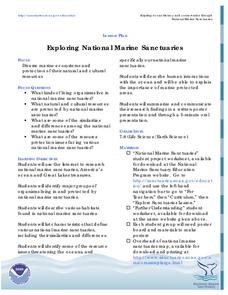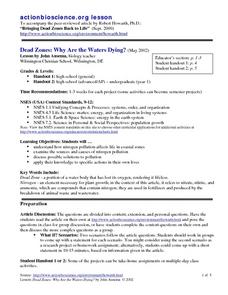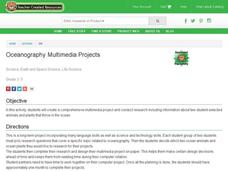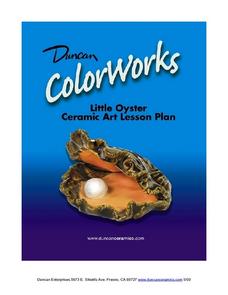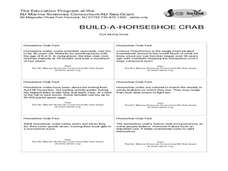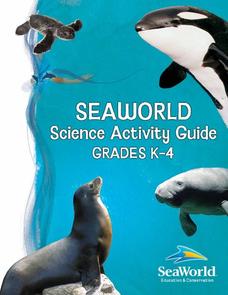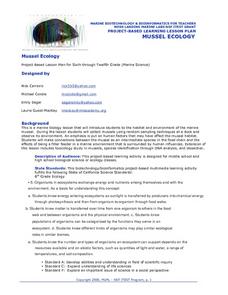Curated OER
Ocean Life
Mini-marine biologists use Scholastic Explorers website to learn about declining numbers of leatherback sea turtles and dusky dolphins. They fill out a K-W-L chart and observation journal worksheet, which are both provided in the lesson...
Curated OER
Turning the Tide on Trash: Marine Debris Curriculum
Six different lessons comprise this unit on marine debris. Science, language arts, social studies, and art projects make this an ideal interdisciplinary unit. The result will be well-informed future citizens who can help make a...
Curated OER
Marine Life Protected Areas in the O.C.
Young scholars research a Marine Protected Area and determine the species' that benefit from its protection. In this marine lesson plan students present their findings to the class using PowerPoint.
Curated OER
Exploring National Marine Sanctuaries
Students research marine ecosystems by creating class presentations. In this oceanography lesson, students research the different locations of marine sanctuaries by identifying them on a transparency map in class. Students...
Curated OER
Dead Zones: Why Are the Waters Dying?
Learners investigate the effects of pollution on marine ecosystems. They read and discuss an article, identify the effects of pollution on marine life, conduct research on local nutrient pollution, and conduct local water quality studies.
Curated OER
Marine Habitats of Galveston Island
Four lessons introduce elementary ecologists to salt marsh and sandy beach habitats. In the first lesson, they place shells and other materials in vinegar to determine if they contain calcium carbonate. In the second lesson, they read a...
EduGAINs
Go Eco! Ecosystems
How is a movie theater like a desert biome? Compare systems to ecosystems with a set of activities that focuses on accessing multiple intelligences and building upon knowledge. As learners discuss the ways elements of an ecosystem depend...
Curated OER
Oceanography Multimedia Projects
Pupils examine marine life. In this oceanography lesson, students design a multimedia project using PowerPoint or HyperStudio that encompasses research that they do on ocean ecosystems.
Curated OER
Little Oyster: Ceramic Lesson
Children will love researching and then creating a bottom dwelling mollusk of their own. They watch clips describing the ocean ecosystem and how oysters fit into their environment. Next, they research what oysters eat and how they look....
Curated OER
Ecosystems and Remote Sensing
Students obtain remote sensing data to compare and contrast global biomass data with global temperature data.
Curated OER
Aquatic Roots
Young scientist use reference materials to research various local aquatic plants and or animals to find out whether they are natives or exotics. They investigate their impacts on people, other animals and the environment. High schoolers...
Bonneville
The Problem of Plastic Trash Islands
Trash collection can be a hassle, especially out in the ocean. The second of four parts in the Adrift in a Sea of Plastic unit has pupils research plastic trash islands in marine ecosystems. They investigate why they occur and potential...
Curated OER
Impacts to the Open Ocean
Students investigate how human beings impact ocean ecosystems. In this ocean ecosystem lesson, students explore how marine debris affects marine life. Internet resources are provided.
Curated OER
Exploring the Beach
Students explore the beach. In this marine habitat lesson, students inspect sand grains, design beach profiles, classify marine life, and examine natural beach habitats. Students use spreadsheets to record data from their activities at a...
Curated OER
Plankton / Phytoplankton
Students discuss the importance of plankton in the ocean ecosystem. In this biology lesson, students identify the different types plankton by observing them under the microscope. They explain how plankton population affect global climate.
Consortium for Ocean Science Exploration and Engagement (COSEE)
Ocean Acidification: Whats and Hows
Open this lesson by demonstrating the production of acidic carbon dioxide gas by activated yeast. Emerging ecologists then experiment with seashells to discover the effect of ocean acidification on shelled marine organisms. They measure...
Curated OER
Design a Reef!
Using a miniature coral reef aquarium kit, young ecologists model this unique ecosystem. They research various coral reef organisms and their niches, and they culminate the project by working together to write a report. Use this activity...
Moorea Coral Reef Long-Term Ecological Research Program
Paper Plate Fishes
Tropical fish make great art projects! Use paper plates to design, color, and assemble round and oval-shaped fish based on photographs of actual fish found along the Moorea Coral Reef. Kids learn about different fins- including the...
Curated OER
Build-A-Horseshoe Crab
Students discover many facts about horseshoe crabs. Students identify the main body parts of horseshoe crab. They explore the habits of the horseshoe crab and their importances to the ecosystem. Adaptations for younger students are...
Sea World
Seaworld Science Activity
A fun collection of activities about marine life would be a great addition to your elementary science unit. From cute penguins to scary sharks, the unit features crafts, experiments, and basic research projects that will teach your...
Curated OER
Mussel Ecology
Students are introduced to the marine environment of the mussel. The emphasis of the lesson is upon what human factors are present to influence the environment in positive and negative ways. They brainstorm in groups in order to conduct...
Curated OER
Climate Change: What's Hot? What's Happening?
Students conduct a web-based project to analyze recent or on-going climate change research in the North. They are exposed to the application of science in current research on climate change.
Curated OER
Water Quality and Dissolved Oxygen
Learners investigate the relationship between dissolved oxygen and organic materials and aquatic organisms. This is a 3-lesson series in which students explore dissolved oxygen and then design an experiment testing the effects of changes.
Michigan Sea Grant
Fish Habitat and Humans
Strict habitat requirements are needed for the survival of fish populations and fish variety in the Great Lakes. Young scientists become experts in the basic needs of fish and understand how survival necessities can vary with different...



